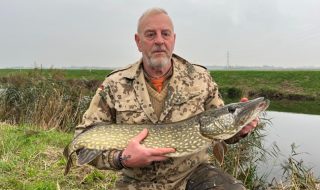The Angling Trust has welcomed the publication of the Government’s Plan for Water but warned that it will fall short without a reversal of the decade long programme of cuts to the Environment Agency’s enforcement and pollution control budgets.
The Plan for Water which was launched today (April 4) contains mix of commitments, plans and funding, many of which have already been announced. It promises to deliver ‘more investment, stronger regulation and tougher enforcement on those who pollute.’
The Environment Agency is to be given additional powers to impose unlimited fines on water companies who pollute. However, there is no mention of replacing the 56% cut in government funding for environment protection which saw EA budgets slashed in real terms from £218.8m in 2009/10 to £94.3m in 2021/22. The situation has now become so dire that last year the EA ordered pollution control staff not to respond to Category 3 & 4 pollutions at all and the number of pollution incidents that triggered a visit has plummeted. Prosecutions for pollutions have fallen as a result to record lows – down from nearly 800 a year in 2009 to just 17 in 2021.
The Plan makes a number of bold promises, including to ‘deliver clean and plentiful water’ and the extraordinary claim that ‘pollution in our rivers has significantly reduced’ despite latest figures showing that during 2020 and 2021 storm overflows have discharged raw or partially treated sewage into our rivers on 760,000 separate occasions, lasting for a total period in excess of 5.7 million hours and the UK’s top bathing beaches experienced 8,500 hours of sewage contamination. The number of discharges reduced slightly in 2022, which according to the Environment Agency was largely due to the drought rather than action by water companies, but storm overflows still spilled for over 1.7million hours.
However, the Plan does include a number of welcome measures that the Angling Trust have been calling for including:
• bringing forward infrastructure investment for new reservoirs,
• a ban on plastic wet wipes, and
• a new Water Restoration Fund using the proceeds of fines levied on polluters to improve environmental outcomes.
Martin Salter, Head of Policy at the Angling Trust said:
“Anglers have been fighting those who treat our rivers as open sewers since we first came together to form the Angling Conservation Association in 1948. Today, as the Angling Trust and Fish Legal, we welcome the fact that years of campaigning against the twin scandals of water industry and agricultural pollution has finally forced the government to try and put together a coherent plan for water.
“We are pleased that they have responded positively to our proposal to use the fines from polluters to improve the environment rather than providing the Treasury with a back door windfall tax. However, these must represent new money and not used as an excuse to cut existing budgets for habitat improvements or river restoration.
“And if ministers are serious about delivering ‘clean and plentiful water’ then they better start reversing the savage cuts made to the Environment Agency’s pollution control budgets so that it has the staff and resources to actually bring polluters to court. Even a five year old knows you can’t impose ‘unlimited fines’ without first securing a prosecution.”
Stuart Singleton-White, Head of Campaigns, said:
“This plan is largely based on announcements and commitments already made across a range of policy areas, drawing as it does from the duties set out in the Environment Act 2021, proposals contained within the changes being made to agricultural subsidies, and the requirements of the Storm Overflow Reduction Plan. There is little that is new, but bringing it together into one plan will help when it comes to holding the government, water companies and the regulators to account.
“What is welcome is the recognition in the plan of the complexity of issues our rivers and waterways face, not only sewage, but agricultural pollution, road run-off, litter and wet wipes, chemical contamination, and the impact of ever-increasing demand and over development.”
More detail is needed before we can be confident this plan will deliver the change that is vital to protect our rivers, fish, and wildlife. Both the Secretary of State, the Rt Hon Thérèse Coffey, and the Minster, the Rt Hon Rebecca Pow, have said: “We know that people across the country want to see more progress in tackling pollution. We agree.” But serious questions remain as to whether this plan will deliver unless the regulators are given the funding needed to ensure actions are delivered and enforcement is carried out when it is not, or where companies and individuals continue to pollute.






